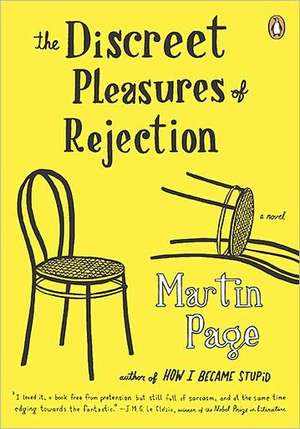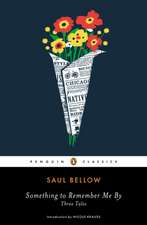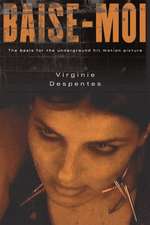The Discreet Pleasures of Rejection
Autor Martin Page Traducere de Bruce Bendersonen Limba Engleză Paperback – 31 dec 2009 – vârsta de la 18 ani
Another mordantly hysterical tale from the author of the cult favorite How I Became Stupid
A funny yet poignant tour of one young man's existential crisis, The Discreet Pleasures of Rejection is another short novel from France's Martin Page. Virgil comes home from work one day to a message on his answering machine-his girlfriend is breaking up with him. This news should be devastating, but instead it's deeply troubling, because Virgil doesn't know the woman and doesn't have any memory of being in a relationship with her. The event sends Virgile into a tailspin of unrelenting self-analysis, causing him to question his memory, his sanity, even his worth as a lover. The seamless translation by Bruce Benderson perfectly captures Page's delicate, witty style, bringing this audacious gem of a novel to English-speaking audiences.
A funny yet poignant tour of one young man's existential crisis, The Discreet Pleasures of Rejection is another short novel from France's Martin Page. Virgil comes home from work one day to a message on his answering machine-his girlfriend is breaking up with him. This news should be devastating, but instead it's deeply troubling, because Virgil doesn't know the woman and doesn't have any memory of being in a relationship with her. The event sends Virgile into a tailspin of unrelenting self-analysis, causing him to question his memory, his sanity, even his worth as a lover. The seamless translation by Bruce Benderson perfectly captures Page's delicate, witty style, bringing this audacious gem of a novel to English-speaking audiences.
Preț: 117.32 lei
Nou
Puncte Express: 176
Preț estimativ în valută:
22.45€ • 23.30$ • 18.77£
22.45€ • 23.30$ • 18.77£
Carte disponibilă
Livrare economică 22 februarie-08 martie
Preluare comenzi: 021 569.72.76
Specificații
ISBN-13: 9780143116523
ISBN-10: 0143116525
Pagini: 182
Dimensiuni: 126 x 182 x 13 mm
Greutate: 0.13 kg
Editura: Penguin Books
ISBN-10: 0143116525
Pagini: 182
Dimensiuni: 126 x 182 x 13 mm
Greutate: 0.13 kg
Editura: Penguin Books
Recenzii
Notă biografică
Martin Page was born in 1975. He is a student of anthropology. This is his first novel.
Extras
Featured Excerpt in the Penguin iPhone App
Book: Paperback | 8.26 x 5.23in | 192 pages | ISBN 9780143116523 | 26 Jan 2010 | Penguin | 18 - AND UP
Excerpted from Chapter 1:
Virgil's shoes slapped the wet street. He'd left Svengali Communications later than usual. Just as the sun was setting he'd noticed the face of the clock above the door.
Located between the Louvre, the Council of State, and the Comédie-Française, the offices of the advertising agency where Virgil worked were in fine company. The entrance to the subway station, caked with multicolored pearls like a child's creation for Mother's Day, appealed to him. Even so, Virgil and this part of the city weren't exactly at home with each other; rubbing shoulders, they kept on their guard, both realizing that things could end badly. The young man claimed only two little islands in this gilded section of the first arrondissement: the Libraire Delamain and the restaurant-café called Á Jean Nicot, the only dive left that wasn't overrun by the smart set. He got onto the bus and punched his ticket. Six months ago he'd stopped taking the subway, weary as he was of putting up with a constant feeling of suffocation, spiked with moments of pure panic.
His body followed the meanderings of his mind. He'd leave the workday little by little. He couldn't handle just walking out of the office, taking the elevator, and going through the doors of the building. He needed a transition. The race through traffic, the movement of the bus's wheels as well as his eyes, which focused on pedestrians, cars, and bicycles, got rid of that day's work and his coworkers. As he got closer to home, he'd find himself again. He wasn't always his best company, but the coexistence of what he thought he was, what he wanted to be, and what he was occurred without much argument.
After nearly knocking down a homeless person, the bus stopped in front of the Gare du Nord. Armelle wasn't at her usual table outside the Terminus. Virgil would have liked to catch a glimpse of her, a touch of lipstick on her mouth, holding a book. He'd get together with her after dinner for a drink.
He said hello to two prostitutes in front of his building. They smiled at him and waved. His mailbox was empty. He climbed the stairs two at a time to the fourth floor, opened the door to his apartment, and tossed the keys into the fruit basket with the bananas and apples.
The red LED on his old cassette answering machine was blinking. Virgil liked getting messages; whether they were from friends or people selling full-service kitchens, they reminded him that he existed in society. But the very first thing he had to do was make something to chow down on, so he inspected the fridge: eggs, some leftover tomatoes wilting in a can, an impressive collection of yogurts. He broke two eggs over a frying pan, covered them, and finally went to push the play button on the machine.
"Virgil," said a woman's voice.
He got closer to the speaker to get a better dose of the captivating voice. God had a woman's voice, he figured. The message went on:
"It's Clara. I'm sorry, but I'd rather stop here. I'm leaving you, Virgil. I'm leaving you."
He listened to the message five more times. The eggs were burning in the frying pan. He splashed cold water on his face, looked at himself in the mirror of the medicine cabinet. He closed his eyes, then opened them after a few seconds. He swallowed a tranquilizer, and went back to the kitchen and turned off the gas. The eggs looked like two pieces of coal, and the smoke coming off them was pungent.
No experience is as painful as a breakup. The separation feels like a meticulously planned assault—because the bomb is placed inside your heart, there's no escaping the violence of the explosion. In the current case, however, Virgil was learning that he'd been dumped by a woman he didn't know and, it was patently obvious, with whom he'd never been. At the same time that he reeled from the shock of discovering he was the object of rejected love, he was aware that the situation lacked reality.
In Virgil's eyes, Earth had never been a very stable heavenly body. He hung on to what little there was that was certain. He was a bachelor. Of course. He had a bachelor's fridge, habits. You could count more on his being single than you could on gravity.
He focused on the things in the room that he found reassuring: his vinyl collection, the red and yellow poster for his parents' circus above the couch with the sagging armrests, the can of chicory coffee, a telephone bill stuck to the fridge with a magnet shaped like an African elephant (its big triangular ears open like the wings of a butterfly, its trunk raised between its tusks). He unplugged the answering machine and left the apartment.
Concentrating on his steps, he walked down the boulevard de Magenta. His body functioned, his joints and muscles were still okay, the blood was flowing in his veins. On the other hand, his brain was close to overheating.
Book: Paperback | 8.26 x 5.23in | 192 pages | ISBN 9780143116523 | 26 Jan 2010 | Penguin | 18 - AND UP
Excerpted from Chapter 1:
Virgil's shoes slapped the wet street. He'd left Svengali Communications later than usual. Just as the sun was setting he'd noticed the face of the clock above the door.
Located between the Louvre, the Council of State, and the Comédie-Française, the offices of the advertising agency where Virgil worked were in fine company. The entrance to the subway station, caked with multicolored pearls like a child's creation for Mother's Day, appealed to him. Even so, Virgil and this part of the city weren't exactly at home with each other; rubbing shoulders, they kept on their guard, both realizing that things could end badly. The young man claimed only two little islands in this gilded section of the first arrondissement: the Libraire Delamain and the restaurant-café called Á Jean Nicot, the only dive left that wasn't overrun by the smart set. He got onto the bus and punched his ticket. Six months ago he'd stopped taking the subway, weary as he was of putting up with a constant feeling of suffocation, spiked with moments of pure panic.
His body followed the meanderings of his mind. He'd leave the workday little by little. He couldn't handle just walking out of the office, taking the elevator, and going through the doors of the building. He needed a transition. The race through traffic, the movement of the bus's wheels as well as his eyes, which focused on pedestrians, cars, and bicycles, got rid of that day's work and his coworkers. As he got closer to home, he'd find himself again. He wasn't always his best company, but the coexistence of what he thought he was, what he wanted to be, and what he was occurred without much argument.
After nearly knocking down a homeless person, the bus stopped in front of the Gare du Nord. Armelle wasn't at her usual table outside the Terminus. Virgil would have liked to catch a glimpse of her, a touch of lipstick on her mouth, holding a book. He'd get together with her after dinner for a drink.
He said hello to two prostitutes in front of his building. They smiled at him and waved. His mailbox was empty. He climbed the stairs two at a time to the fourth floor, opened the door to his apartment, and tossed the keys into the fruit basket with the bananas and apples.
The red LED on his old cassette answering machine was blinking. Virgil liked getting messages; whether they were from friends or people selling full-service kitchens, they reminded him that he existed in society. But the very first thing he had to do was make something to chow down on, so he inspected the fridge: eggs, some leftover tomatoes wilting in a can, an impressive collection of yogurts. He broke two eggs over a frying pan, covered them, and finally went to push the play button on the machine.
"Virgil," said a woman's voice.
He got closer to the speaker to get a better dose of the captivating voice. God had a woman's voice, he figured. The message went on:
"It's Clara. I'm sorry, but I'd rather stop here. I'm leaving you, Virgil. I'm leaving you."
He listened to the message five more times. The eggs were burning in the frying pan. He splashed cold water on his face, looked at himself in the mirror of the medicine cabinet. He closed his eyes, then opened them after a few seconds. He swallowed a tranquilizer, and went back to the kitchen and turned off the gas. The eggs looked like two pieces of coal, and the smoke coming off them was pungent.
No experience is as painful as a breakup. The separation feels like a meticulously planned assault—because the bomb is placed inside your heart, there's no escaping the violence of the explosion. In the current case, however, Virgil was learning that he'd been dumped by a woman he didn't know and, it was patently obvious, with whom he'd never been. At the same time that he reeled from the shock of discovering he was the object of rejected love, he was aware that the situation lacked reality.
In Virgil's eyes, Earth had never been a very stable heavenly body. He hung on to what little there was that was certain. He was a bachelor. Of course. He had a bachelor's fridge, habits. You could count more on his being single than you could on gravity.
He focused on the things in the room that he found reassuring: his vinyl collection, the red and yellow poster for his parents' circus above the couch with the sagging armrests, the can of chicory coffee, a telephone bill stuck to the fridge with a magnet shaped like an African elephant (its big triangular ears open like the wings of a butterfly, its trunk raised between its tusks). He unplugged the answering machine and left the apartment.
Concentrating on his steps, he walked down the boulevard de Magenta. His body functioned, his joints and muscles were still okay, the blood was flowing in his veins. On the other hand, his brain was close to overheating.
Descriere
A funny yet poignant tour of one young man's existential crisis, "The Discreet Pleasures of Rejection" is another short novel from the author of the cult favorite "How I Became Stupid."














